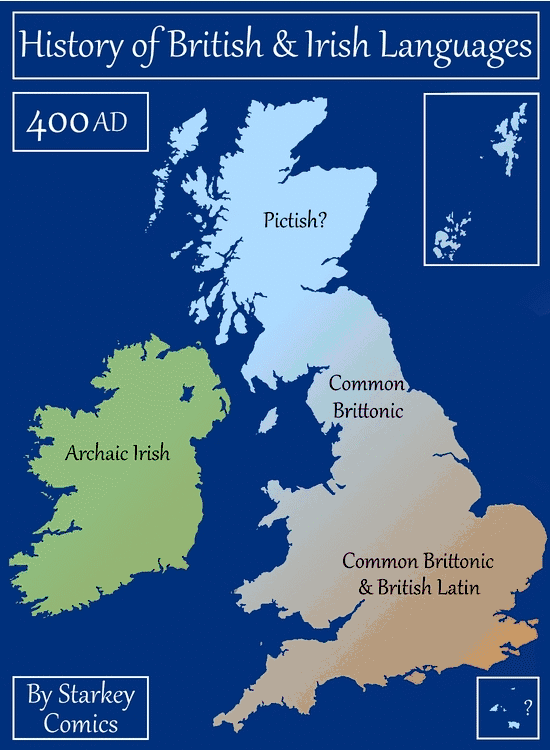The Languages of D&D Imply a Specific Setting
Like many with an abiding interest in Dungeons & Dragons (the generic concept, not any particular iteration published by a corporation), I also have a passing interest in medievalism. Recently, I was reading about the medieval kingdom of Northumbria recently, as one does, and came across the following quote from its Wikipedia page:
“In the time of [Saint Bede the Venerable], there were five languages in Britain: English, British, Irish, Pictish, and Latin. Northumbrian was one of four distinct dialects of Old English, along with Mercian, West Saxon, and Kentish.”
I was struck by the sheer diversity of languages in such a small geographic area, and not a particularly populous one either. I took to Twitter (always ill-advised) to remark on this and contrasted it with D&D wherein common is incredibly widespread, and there is little variation in languages such as dwarven despite it presumably existing in pockets all over the world (if not the multiverse, if using one of D&D’s more high concept settings). As I opined on the hellsite, the way languages are handled in D&D is way too modern. Every dwarf stronghold should speak its own dialect of dwarven. “Common” should either only be the common tongue in one limited area or be a pidgin only really useful for trade between groups with their own languages. The Twittering class, of course, took this very normally, and I was cascaded with responses that ultimately amounted to “shut up!! I don’t want to think!!!” Too damn bad.
When confronted with the undeniable fact that language in D&D, ostensibly set in a medieval milieu, operates in stark contrast with how it operated in the earth’s own medieval past, there are three possible responses. The first, and seemingly most popular, is the aforementioned desire to ignore it. Anything that would approach verisimilitude would be unwieldy! And it isn’t fun when there are communication issues. As one commenter observed, “If I did that, no one would be able to talk to each other, and it would greatly restrict stories. It’s a necessary evil.”
For those already in the old school camp, the idea that the goal of a roleplaying game is to promote storytelling (as opposed to stories being a mere byproduct of gaming) is already a suspect grounding, but even beyond that, this claim doesn’t hold. Just look at Shōgun, which swept the Emmy Awards in September. (I believe the “Emmy Awards” are a play on the more well-known and prestigious Ennie Awards, but I can’t be certain.) In that show, the inability of the shipwrecked Englishman to speak Japanese and his reliance on Portuguese translators is not an impediment to the story; it is a major driver of it! Relying on a translator, and especially his relationship with the translator and the translator’s relationship with her Japanese compatriots and Portuguese fellow believers, is a constant source of drama and intrigue. There is no reason that language barriers can’t similarly play a dramatic role in a session or even campaign of a TTRPG. And, if language barriers are such an impediment, why even keep the smattering of languages that D&D does offer? Just toss them all out–everyone speaks common now. But that isn’t what most of the people with the knee-jerk “shut up!” reaction suggested.
The second approach to mapping the complexity of real world languages onto the game is to find a way that is gameable (i.e., not a total slog that distracts from the real juice of a game like D&D) to represent this. I wrote about my rules for language last year, which attempt to do just that. In those rules, you don’t select all of your languages at the outset. Instead, when you encounter a new language for the first time, if there is a reason your character might know the language, you make an ability check to determine how well you know it. That may be total fluency, just enough to communicate simple concepts, or so poorly that you unintentionally offend the listener. This allows the game to have as many languages as makes sense in the context of the setting without slowing down the game. Language only comes up exactly when it comes up and there is a quick method for adjudicating it, if need be.
However, the third response to languages in D&D, and the reason I was interested in writing this post, is to start with the “D&D is always right” mantra and then question what this means for the implied setting of D&D. For those unfamiliar with this concept, it is a creative exercise to assume any given rule in D&D does make total sense and to extrapolate from there the reason it makes sense. So if it actually makes sense for there to be a “common” tongue, which is widely spoken and isn’t simply a trade language as evidenced by the fact that it is the only language spoken by many in D&D, and many other languages that are mostly racial in nature (e.g., dwarven, elven, gnomish, orcish, etc.) but are consistent across the world despite these groups of peoples existing in small pockets scattered throughout the world, then why does this make sense?
Linguistic diversity hates to see them coming.
As for the prevalence and consistency of common, it suggests that the implied setting of D&D is imperial. Like the Romans imposed Latin wherever they went, there must be some Rome of Common that has colonized the world and imposed its lingua on its subjects. One commenter on my tweet, obviously engaged in this third approach, suggested that common wasn’t the result of an extant empire but a fallen one. While much else in the D&D implied setting points to it being post-apocalyptic, after the collapse of some unifying empire, the fact that common hasn’t begun to splinter is evidence that either the empire is still functioning or has only collapsed recently. Taking our world history as a model, the Romance languages had not begun to splinter from vulgar Latin until after the fall of the Roman Empire. If the Common Empire has fallen in the implied setting of D&D, it is a recent phenomenon, certainly not ancient history.
I want to look at another real world analog to explain the consistency of the various ancestral languages: religious languages. Take, for instance, Jewish people in the medieval period. Due in part to their poor treatment across medieval European history (and beyond, but our focus here is medieval history), Jewish people lived in communities scattered throughout Europe. For instance, the Jewish people who settled in the Iberian peninsula are the Sephardic Jews while those who settled initially in Germany and France are the Ashkenazi Jews. Despite the geographic separation, however, these groups don’t speak two different forms of Hebrew. Even as these Jewish communities adopted the languages of the places they settled (and developed new languages like Yiddish), Hebrew never died because of traditions of studying the Torah (written in Hebrew) and reading it aloud. As this article which further details how Hebrew has survived for millennia states, “Jews continued to learn Hebrew to read from the Bible and written Hebrew lived on for more than a millennium mostly through religious practice.” This isn’t unique to Hebrew either. The Roman Empire fell long ago, and now the only speakers of Latin are Catholic clergy.
For Dwarven, Orcish and similar languages to continue to be coherent even as the speakers of these languages are isolated from each other suggests some level of reverence for these languages and likely some type of ceremonial practices around the languages. These are likely sacred languages to these groups. This is also why even dwarves who were raised in human settlements still know dwarven–it isn’t merely about communication. It is about connection to a larger tradition for an entire people. These sacred languages are likely all the more important given the Common Empire and its linguistic colonization of the world.
While it is easy to tell anyone pointing out some potential contradiction in D&D to shut up and stop spoiling your fun, it is perhaps more fruitful to consider whether this contradiction can be squared with a rational setting. If you start with the “D&D is always right” premise and build on that framework, you may come up with an interesting setting that reasonably follows from D&D’s rules, rather than having those rules clunkily bump and grind against a setting that doesn’t fit.



